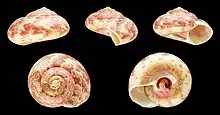Ethalia guamensis
Ethalia guamensis, common name the Guam button top shell, is a species of sea snail, a marine gastropod mollusk in the family Trochidae, the top snails.[2][3][4]
| Ethalia guamensis | |
|---|---|
 | |
| A shell of Ethalia guamensis | |
| Scientific classification | |
| Domain: | Eukaryota |
| Kingdom: | Animalia |
| Phylum: | Mollusca |
| Class: | Gastropoda |
| Subclass: | Vetigastropoda |
| Order: | Trochida |
| Superfamily: | Trochoidea |
| Family: | Trochidae |
| Genus: | Ethalia |
| Species: | E. guamensis |
| Binomial name | |
| Ethalia guamensis (Quoy & Gaimard, 1834) [1] | |
| Synonyms[2] | |
| |
The subspecies Ethalia guamensis selenomphala Pilsbry, 1905 is a taxon inquirendum.
Description
The length of the shell varies between 10 mm and 25 mm. The depressed, polished shell is perforate, solid, strong, and smooth. Its color is whitish, mottled and lineolate above with brown, reddish, fawn-color or purplish, with 4 narrow spiral articulated lines, sometimes scarcely visible because of the variegated coloration. The color of the base is lighter. There are six whorls, convex, the last one rounded and convex beneath. The suture is impressed. The aperture is oblique. The outer wall is moderately thick. The columella is strong and thick, arcuate above, spread upon the body whorl and nearly over the umbilicus in a pad of callus, which is either white, pink or deep crimson. The callus is kidney-shaped, but slightly convex, filling the umbilicus except a narrow chink. From the outer termination of the callus an arcuate groove extends to the base of the columella, within which the surface of the shell is radiately finely striate and darker colored.[5]

Radula: The teeth, especially those of the central part are very thin and transparent, without distinct cusps; the rhachidian tooth (R) is broadly winged, bow-shaped, at its upper part it is thickened, a true cusp cannot be detected. The first (i), second (2), third (3) and fourth (4) laterals are about equal in shape. The first one is subtriangular, with a slightly concave inner and convex outer margin, thickened at its upper part, the second is very similar, the third is narrower and the fourth is more subquadrangularly elongate; the fifth (5) or last lateral is club-shaped, thickened above, without cusp. Of the uncini (U) the proximal one has a short, broad cusp, with a small denticle near the base of the distal margin; the second is more elongate, also with a small denticle; the subsequent ones are much more elongate, No denticles can be detected, perhaps because the cusps lie so close together, as to cover each other in part.[6]
Distribution
This marine species occurs off Southeast Asia, Guam, the Philippines, Japan and Australia.
References
- Quoy, J.R. & Gaimard, J.P. 1834. Voyage de Découvertes de l'Astrolabe exécuté par Ordre du Roi, Pendant les Années 1826-1829. Paris : J. Tastu Zoologie Vol. 3 366 pp.
- Bouchet, P. (2012). Ethalia guamensis (Quoy & Gaimard, 1834). Accessed through: World Register of Marine Species at http://www.marinespecies.org/aphia.php?p=taxdetails&id=547307 on 2012-11-23
- Poppe G.T., Tagaro S.P. & Dekker H. (2006) The Seguenziidae, Chilodontidae, Trochidae, Calliostomatidae and Solariellidae of the Philippine Islands. Visaya Supplement 2: 1-228.
- Herbert D.G. (1996) A critical review of the trochoidean types in the Muséumd'Histoire naturelle, Bordeaux (Mollusca, Gastropoda). Bulletin du Muséum national d'Histoire naturelle, Paris, ser. 4, 18 (A, 3-4): 409-445.
- Tryon (1889), Manual of Conchology XI, Academy of Natural Sciences, Philadelphia
- Schepman 1908-1913, The Prosobranchia of the Siboga Expedition; Leyden,E. J. Brill,1908-13
- Adams, A. 1855. A monograph of Umbonium (Rotella), a genus of Trochidae. Proceedings of the Zoological Society of London 1853(21): 187-189
- Hedley, C. 1907. The Mollusca of Mast Head Reef, Capricorn Group, Queensland, part II. Proceedings of the Linnean Society of New South Wales 32: 476-513, pls 16-21
- Schepman, M.M. 1908. Prosobranchia (excluding Heteropoda and parasitic Prosobranchia). Rhipidoglossa and Docoglossa. With an appendix by Prof. R. Bergh [Pectinobranchiata]. Siboga-Expéditie Report 49(1): 1-108, 9 pls
- Yen, T.C. 1942. A review of the Chinese gastropods in the British Museum. Proceedings of the Malacological Society of London 24(5/6): 170-290
- Abbott, R.T. & Dance, S.P. 1982. Compendium of Seashells: a colour guide to more than 4,200 of the world's marine shells. New York : E. P. Dutton pp. i-x, 1-411.
- Wilson, B. 1993. Australian Marine Shells. Prosobranch Gastropods. Kallaroo, Western Australia : Odyssey Publishing Vol. 1 408 pp.
External links
- To Barcode of Life (1 barcode)
- To Biodiversity Heritage Library (18 publications)
- To Encyclopedia of Life
- To GenBank (3 nucleotides; 1 proteins)
- To World Register of Marine Species
- "Ethalia guamensis". Gastropods.com. Retrieved 16 January 2019.